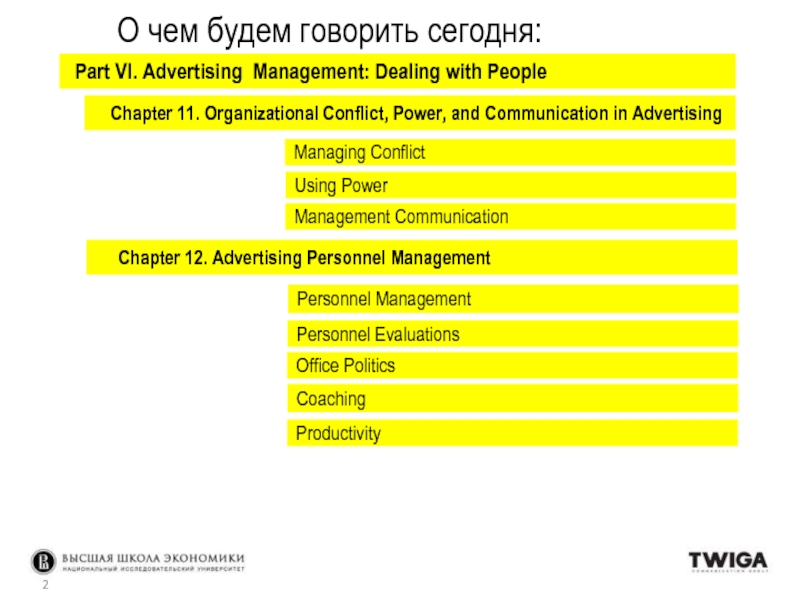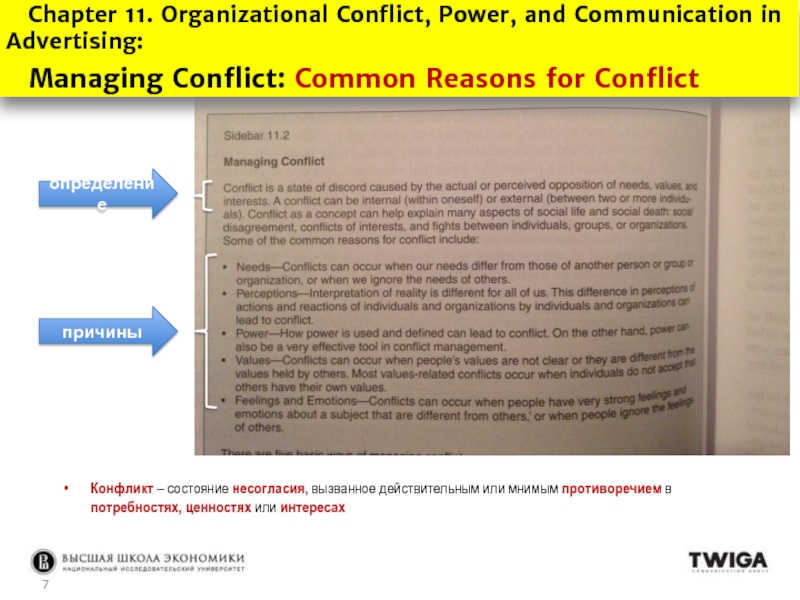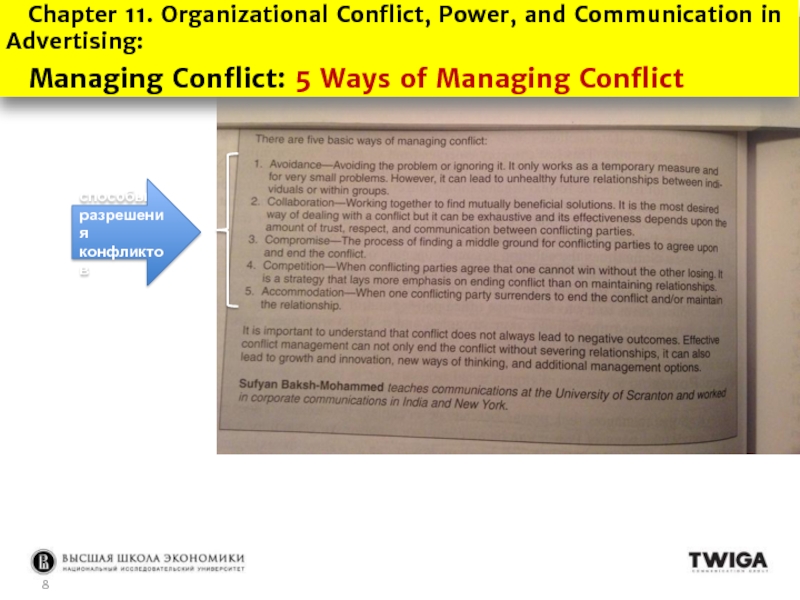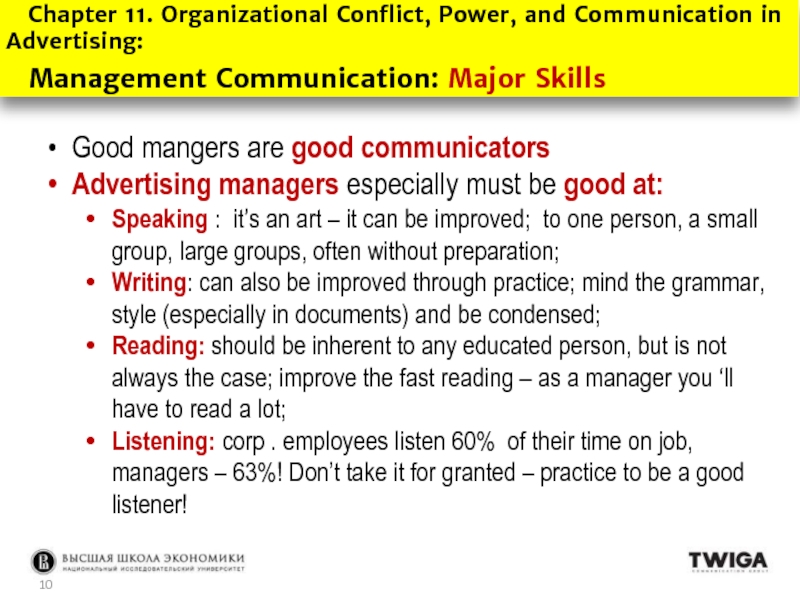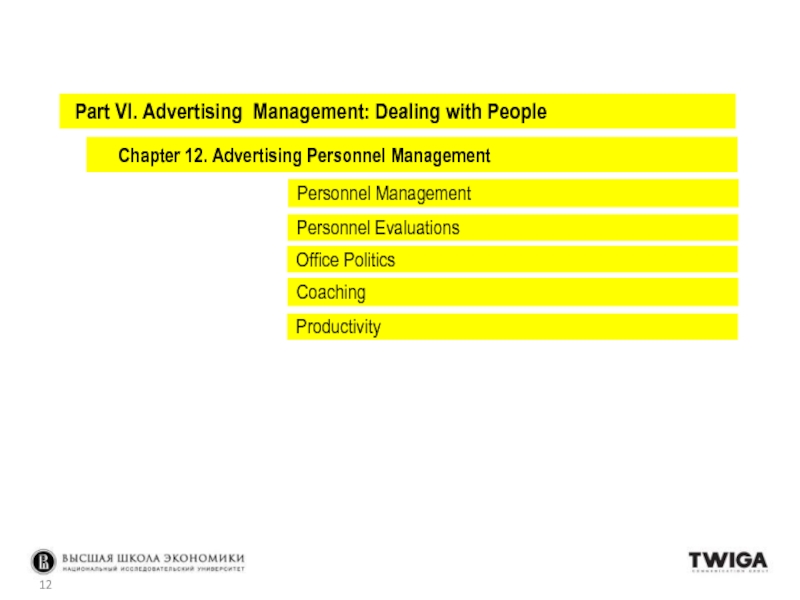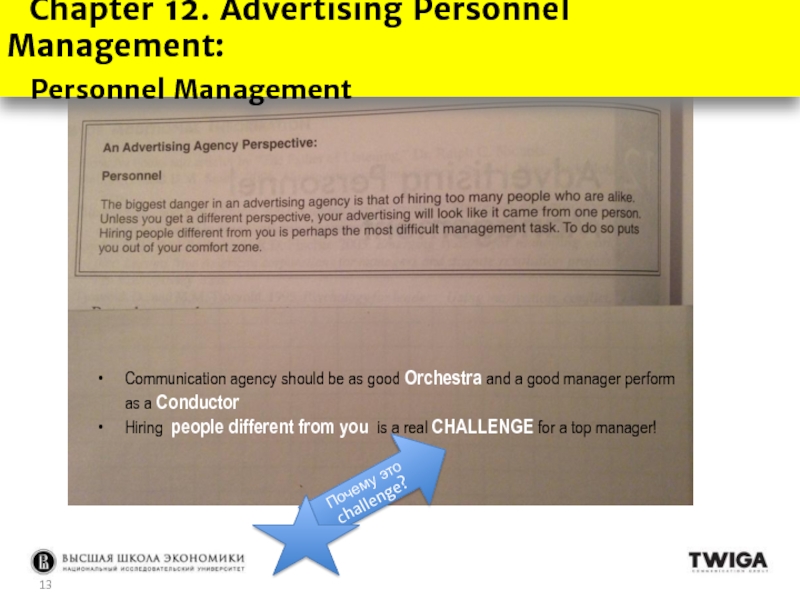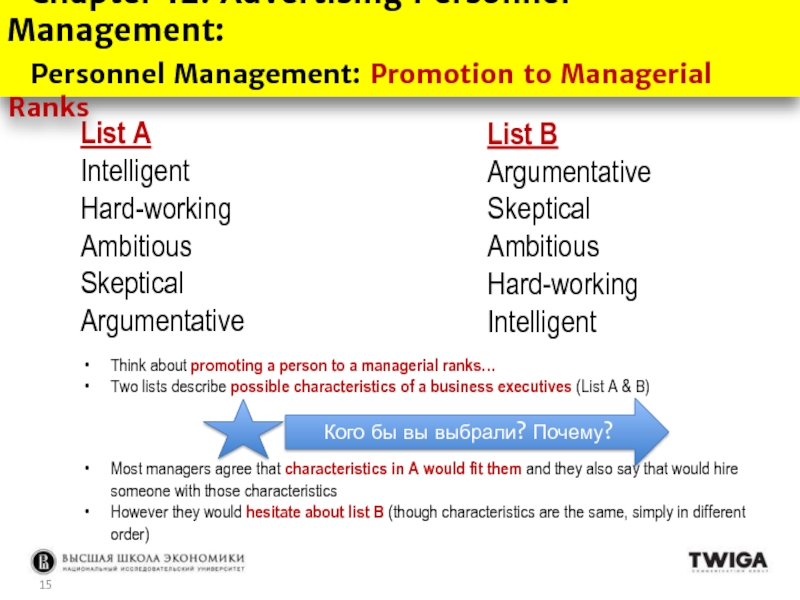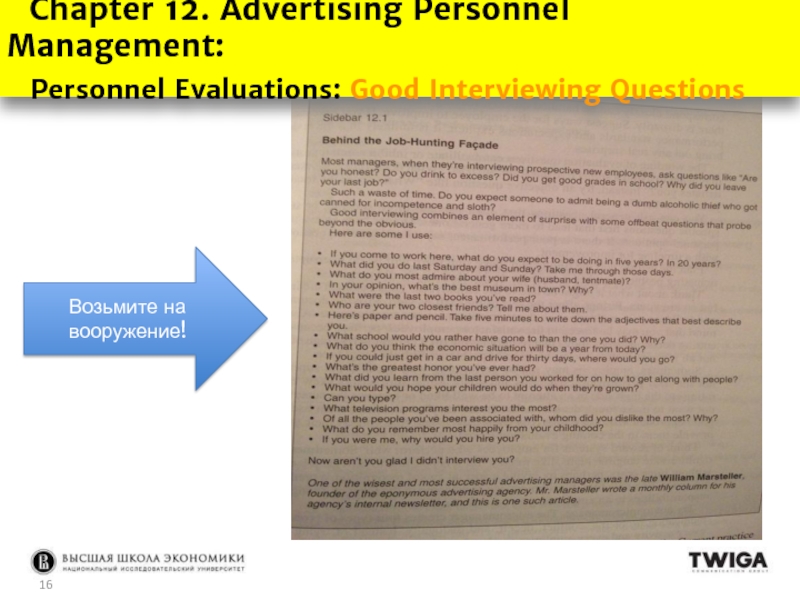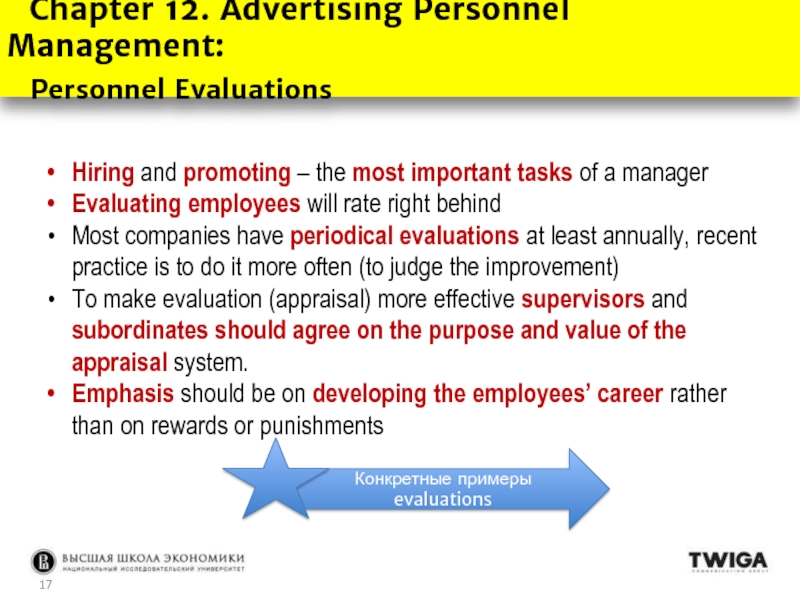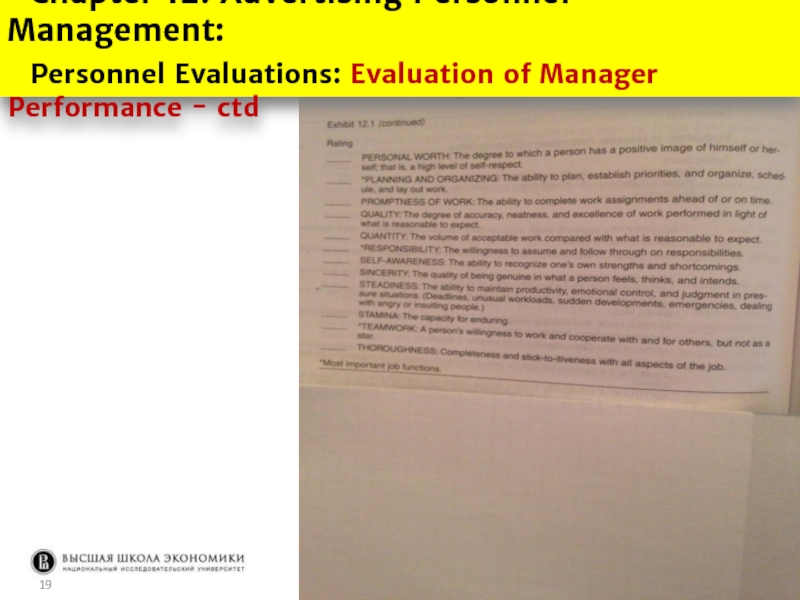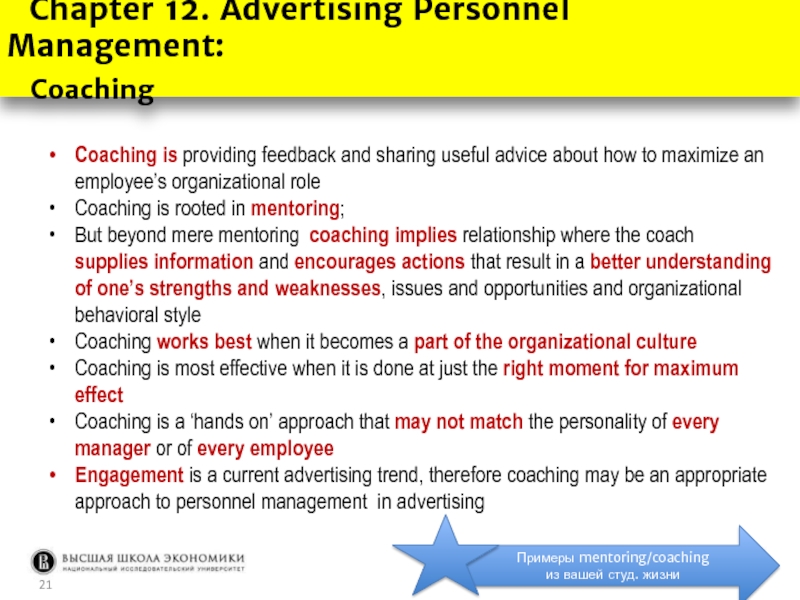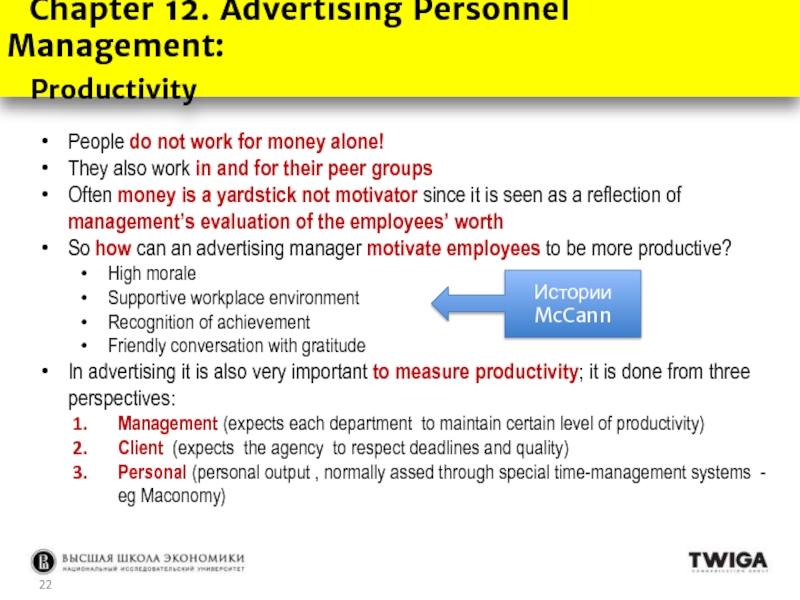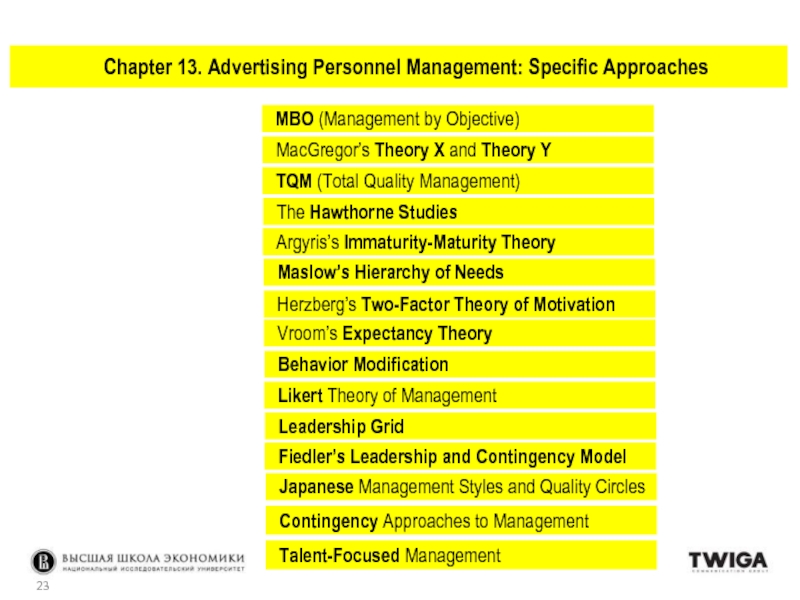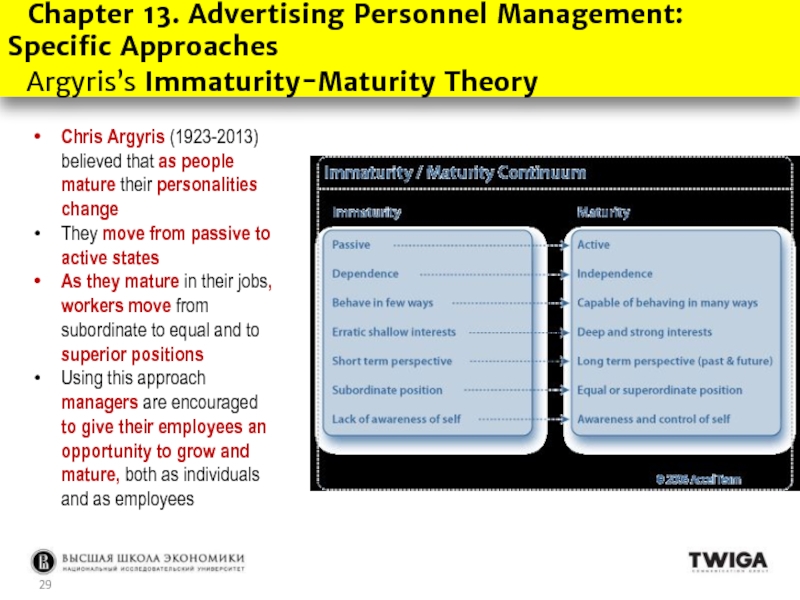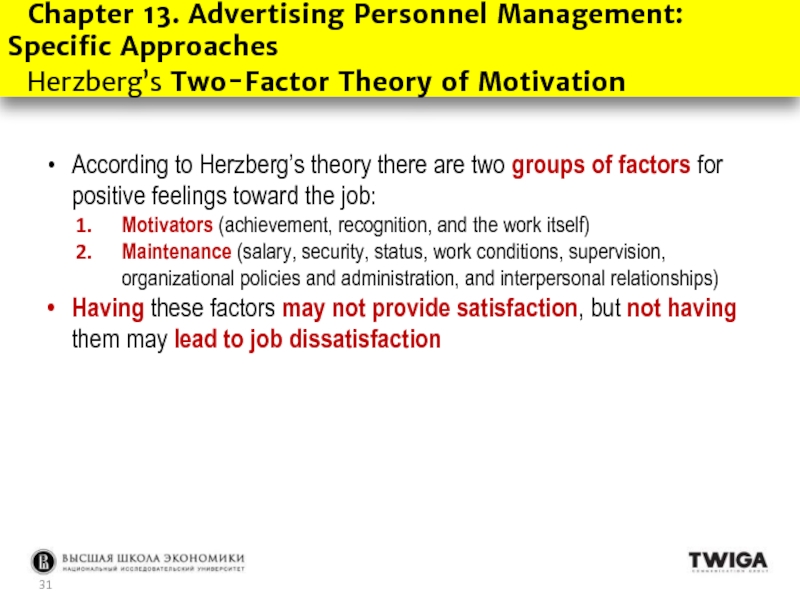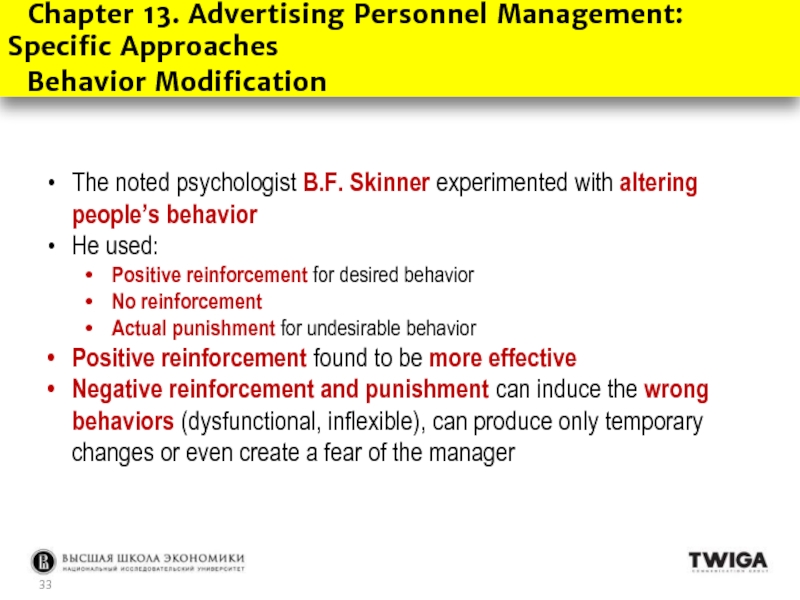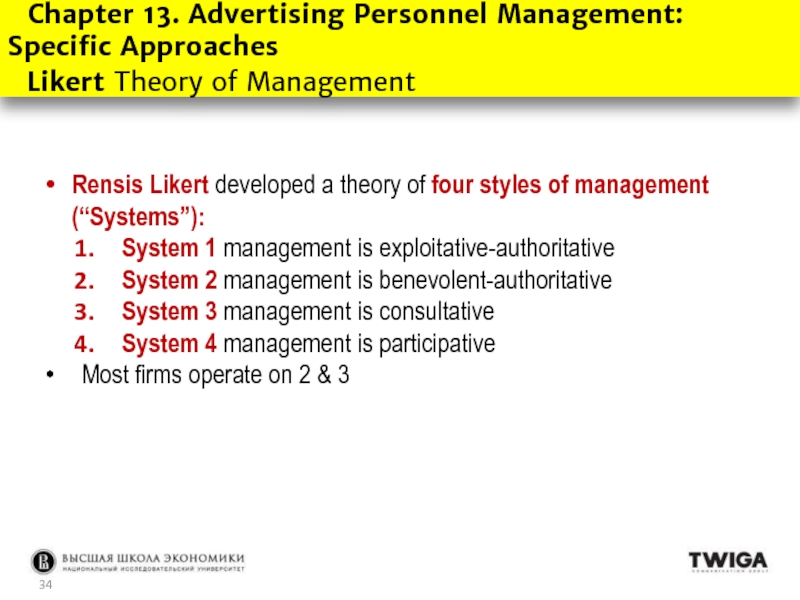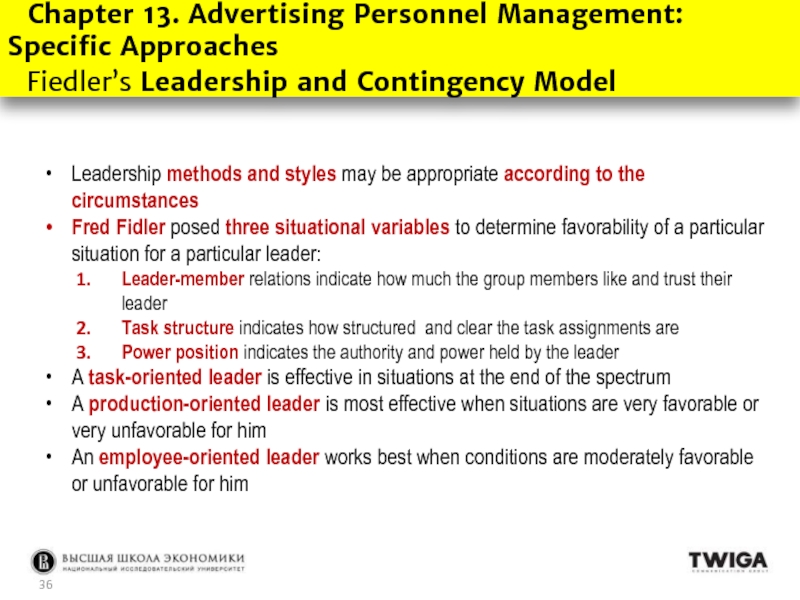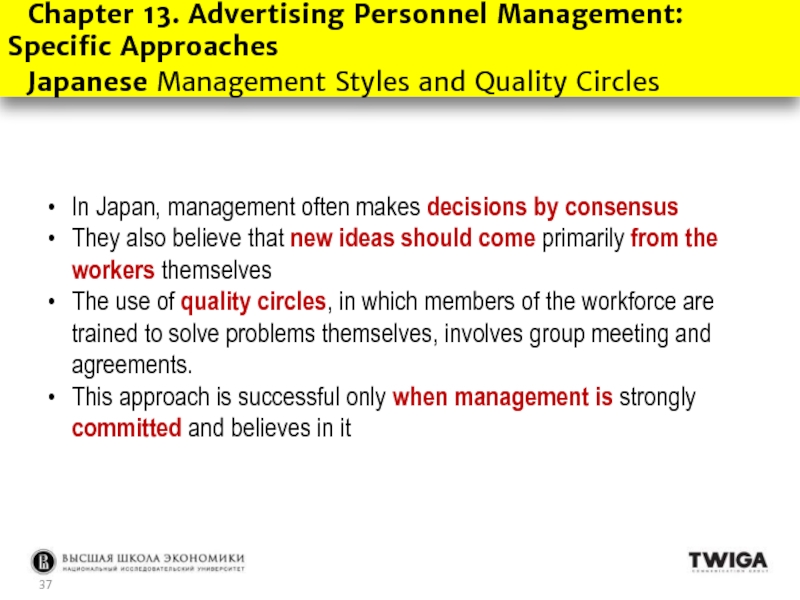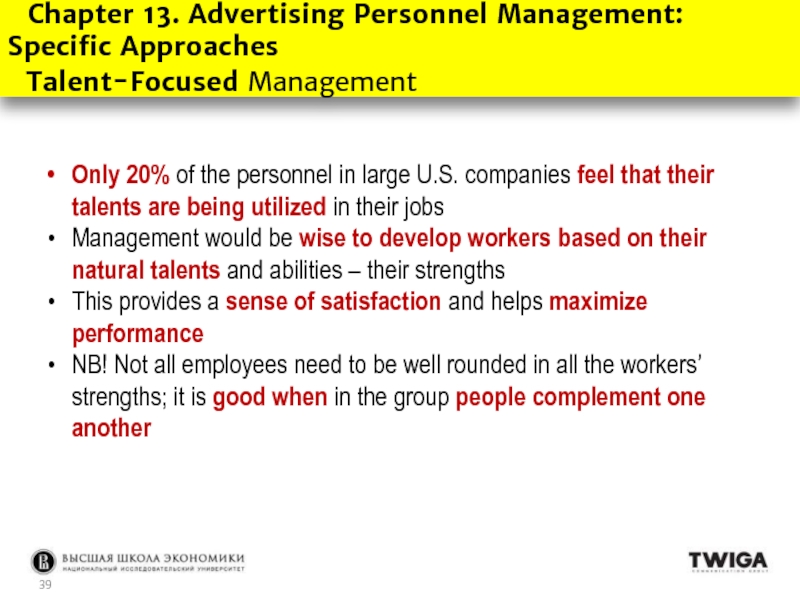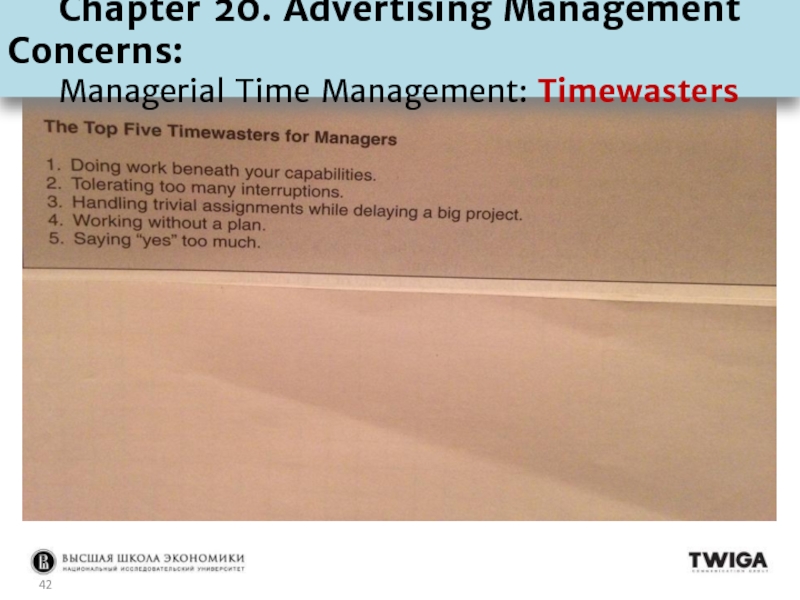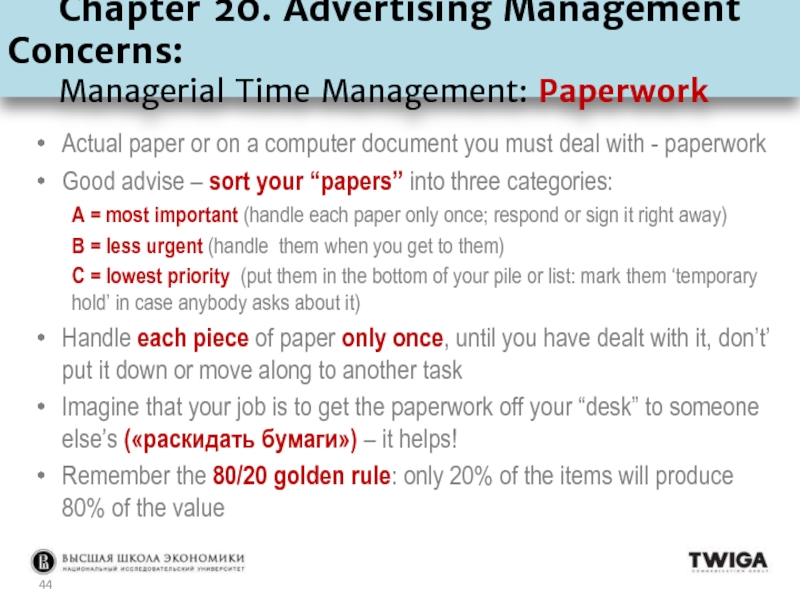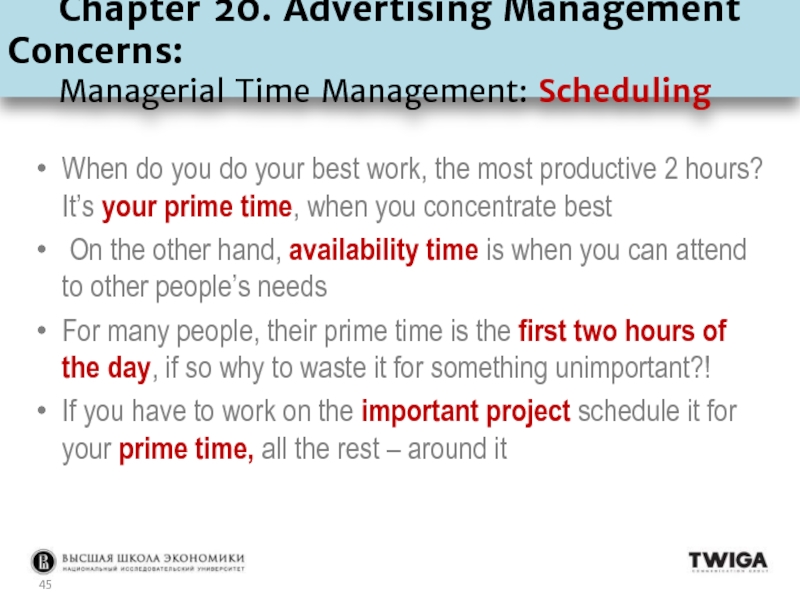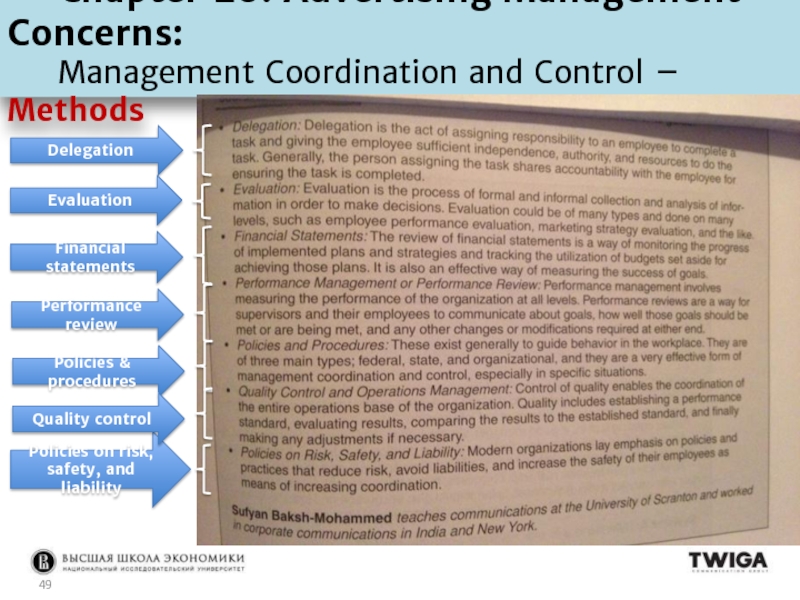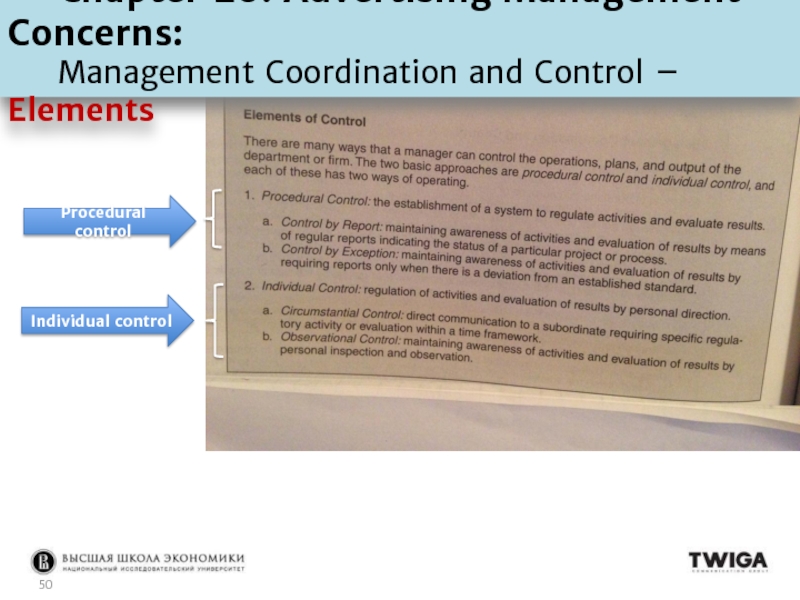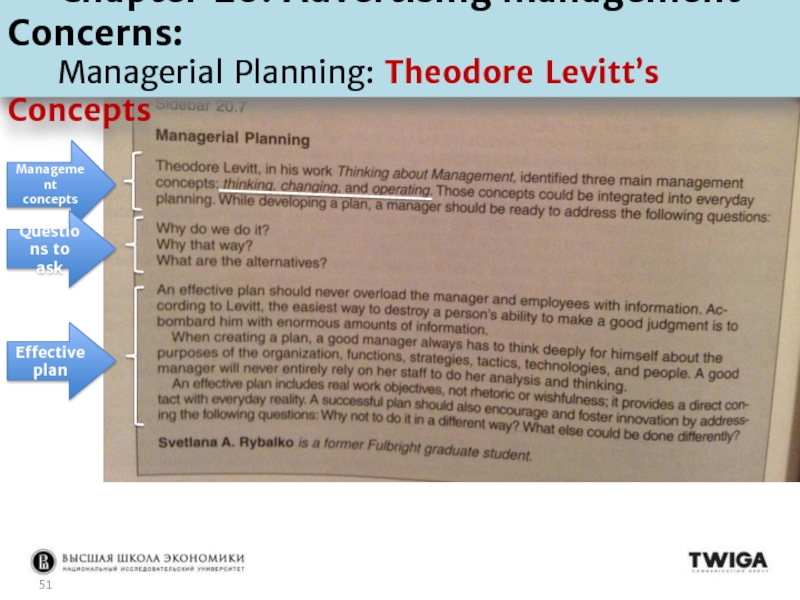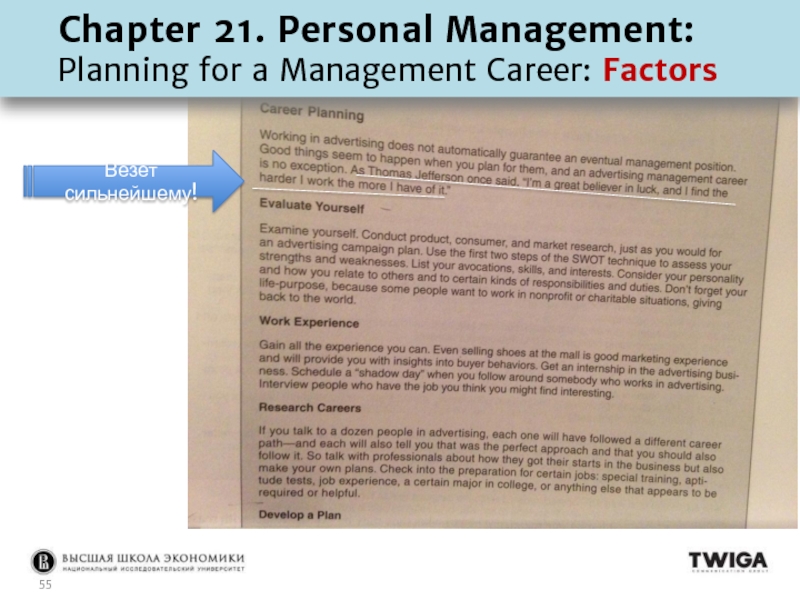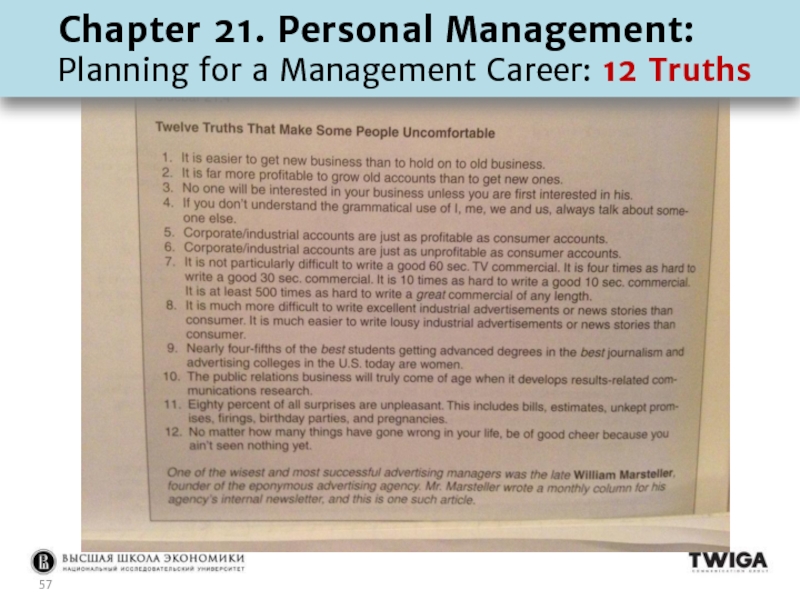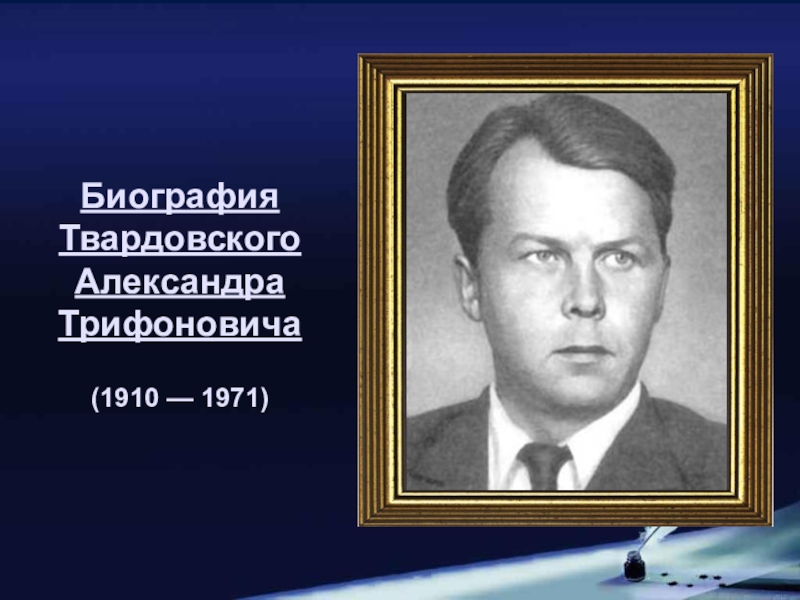Разделы презентаций
- Разное
- Английский язык
- Астрономия
- Алгебра
- Биология
- География
- Геометрия
- Детские презентации
- Информатика
- История
- Литература
- Математика
- Медицина
- Менеджмент
- Музыка
- МХК
- Немецкий язык
- ОБЖ
- Обществознание
- Окружающий мир
- Педагогика
- Русский язык
- Технология
- Физика
- Философия
- Химия
- Шаблоны, картинки для презентаций
- Экология
- Экономика
- Юриспруденция
Управление в рекламе/ Advertising Management Лекции 8-9: Advertising
Содержание
- 1. Управление в рекламе/ Advertising Management Лекции 8-9: Advertising
- 2. О чем будем говорить сегодня: Part
- 3. О чем будем говорить сегодня: MBO
- 4. О чем будем говорить сегодня: Managerial Time
- 5. Part VI. Advertising Management: Dealing
- 6. Reasons for conflicts:People are incompatible Individual or
- 7. Конфликт – состояние несогласия, вызванное действительным или
- 8. способы разрешения конфликтов Chapter 11. Organizational
- 9. Power can be elixir or poison Power
- 10. Good mangers are good communicators Advertising managers
- 11. Chapter 11. Organizational Conflict, Power,
- 12. Part VI. Advertising Management: Dealing
- 13. Communication agency should be as good Orchestra
- 14. Employees’ perspective (when employees asked what they
- 15. List AIntelligentHard-working AmbitiousSkepticalArgumentative Chapter 12. Advertising
- 16. Chapter 12. Advertising Personnel Management: Personnel Evaluations: Good Interviewing Questions Возьмите на вооружение!
- 17. Hiring and promoting – the most important
- 18. Chapter 12. Advertising Personnel Management: Personnel Evaluations: Evaluation of Manager Performance
- 19. Chapter 12. Advertising Personnel Management: Personnel Evaluations: Evaluation of Manager Performance - ctd
- 20. Chapter 12. Advertising Personnel Management:
- 21. Coaching is providing feedback and sharing useful
- 22. People do not work for money alone!They
- 23. MBO (Management by Objective)
- 24. MBO has been used for many years
- 25. Chapter 13. Advertising Personnel Management:
- 26. Douglas MacGregor developed both MBO and Theory
- 27. Total Quality Management (TQM) is what the
- 28. Research conducted by Elton Mayo at Harvard
- 29. Chapter 13. Advertising Personnel Management:
- 30. Abraham Maslow, well known in human motivation
- 31. According to Herzberg’s theory there are two
- 32. Victor Vroom created a model showing how
- 33. The noted psychologist B.F. Skinner experimented with
- 34. Rensis Likert developed a theory of four
- 35. Leadership Grid is a trademarked theory developed
- 36. Leadership methods and styles may be appropriate
- 37. In Japan, management often makes decisions by
- 38. Success of a manager may depend on
- 39. Only 20% of the personnel in large
- 40. Managerial Time Management Management Theory
- 41. Time management is especially important in advertising
- 42. Chapter 20. Advertising Management Concerns: Managerial Time Management: Timewasters
- 43. Chapter 20. Advertising Management
- 44. Actual paper or on a computer document
- 45. When do you do your best work,
- 46. Theories are not necessarily true – they
- 47. Chapter 20. Advertising Management
- 48. Coordinating what other people do is a
- 49. Chapter 20. Advertising Management
- 50. Procedural controlIndividual control Chapter 20.
- 51. Chapter 20. Advertising Management
- 52. Part Х. Managing Yourself
- 53. If you can manage an advertising campaign
- 54. If you don’t plan where you want
- 55. Chapter 21. Personal Management: Planning for a Management Career: FactorsВезет сильнейшему!
- 56. Chapter 21. Personal Management: Planning for a Management Career: Factors/ctd
- 57. Chapter 21. Personal Management: Planning for a Management Career: 12 Truths
- 58. Your career is like a product, you
- 59. Chapter 21. Personal Management:
- 60. Скачать презентанцию
Слайды и текст этой презентации
Слайд 1«Управление в рекламе/
Advertising Management»
Лекции 8-9: «Advertising Management:
Dealing with People»/ «Managing
Yourself»
учебный год; 3 курс,Слайд 2О чем будем говорить сегодня:
Part VI. Advertising Management:
Dealing with People
Managing Conflict
Chapter 11. Organizational
Conflict, Power, and Communication in Advertising Using Power
Management Communication
Personnel Management
Chapter 12. Advertising Personnel Management
Personnel Evaluations
Office Politics
Coaching
Productivity
Слайд 3О чем будем говорить сегодня:
MBO (Management by Objective)
MacGregor’s Theory X and Theory Y
TQM (Total
Quality Management) Chapter 13. Advertising Personnel Management: Specific Approaches
The Hawthorne Studies
Argyris’s Immaturity-Maturity Theory
Maslow’s Hierarchy of Needs
Herzberg’s Two-Factor Theory of Motivation
Vroom’s Expectancy Theory
Behavior Modification
Likert Theory of Management
Leadership Grid
Fiedler’s Leadership and Contingency Model
Japanese Management Styles and Quality Circles
Contingency Approaches to Management
Talent-Focused Management
Слайд 4О чем будем говорить сегодня:
Managerial Time Management
Management
Theory
Chapter 20. Advertising Management Concerns
Part Х.
Managing YourselfPaperwork
Scheduling
Management Philosophy
Management Coordination and Control
Managerial Planning
Managing Your Career
Career Goals
Chapter 21. Personal Management
Planning for a Management Career
Measures of Success
Слайд 5 Part VI. Advertising Management: Dealing with People
Managing Conflict
Chapter 11. Organizational Conflict, Power, and Communication
in Advertising Using Power
Management Communication
Слайд 6Reasons for conflicts:
People are incompatible
Individual or groups are working
towards conflicting goals
Some persons just don’t like to cooperate (sometimes
or on some issues) Conflict is inevitable (happens to every person, in every organization, most often to managers)
Generally conflict is perceived as negative, but some research suggests it may be used by management to improve effectiveness
Major approaches to managing conflicts:
“Pacific settlement” (people should first air differences and then work to mutually satisfactory solutions)
“Forced settlement” (power is used to overcome conflict, win/lose situation, manager as arbitrator)
“Bargaining” (trying to get conflicting views to work out their problems; “win/win” situation, helped by mediators)
Important! Solutions for conflict usually involve finding the root issue
Solutions should include the subject of conflict (structure-structure, authority-authority)
Office politics should not be controlled rather followed and counter with good listening and open communication
Chapter 11. Organizational Conflict, Power, and Communication in Advertising:
Managing Conflict: Reasons, Approaches to Managing
Слайд 7Конфликт – состояние несогласия, вызванное действительным или мнимым противоречием в
потребностях, ценностях или интересах
Chapter 11. Organizational Conflict,
Power, and Communication in Advertising:Managing Conflict: Common Reasons for Conflict
определение
причины
Слайд 8способы разрешения конфликтов
Chapter 11. Organizational Conflict, Power, and
Communication in Advertising:
Managing Conflict: 5 Ways of Managing Conflict
Слайд 9Power can be elixir or poison
Power may be used
to exploitation of others or to put fear into subordinates
– this is poor use of powerBut the best Power comes from respect of subordinates
Power doesn’t arise from position, it arises from relationship we develop with stakeholders (see the above story)
Chapter 11. Organizational Conflict, Power, and Communication in Advertising:
Using Power
ОБСУЖДЕНИЕ
Слайд 10Good mangers are good communicators
Advertising managers especially must be
good at:
Speaking : it’s an art – it can be
improved; to one person, a small group, large groups, often without preparation; Writing: can also be improved through practice; mind the grammar, style (especially in documents) and be condensed;
Reading: should be inherent to any educated person, but is not always the case; improve the fast reading – as a manager you ‘ll have to read a lot;
Listening: corp . employees listen 60% of their time on job, managers – 63%! Don’t take it for granted – practice to be a good listener!
Chapter 11. Organizational Conflict, Power, and Communication in Advertising:
Management Communication: Major Skills
Слайд 11 Chapter 11. Organizational Conflict, Power, and Communication in
Advertising:
Management Communication: How to Be a Good Listener
Разбор «Мои
ошибки»Слайд 12 Part VI. Advertising Management: Dealing with People
Personnel Management
Chapter 12. Advertising Personnel Management
Personnel Evaluations Office Politics
Coaching
Productivity
Слайд 13Communication agency should be as good Orchestra and a good
manager perform as a Conductor
Hiring people different from you is a real CHALLENGE for a top manager!
Chapter 12. Advertising Personnel Management:
Personnel Management
Почему это challenge?
Слайд 14Employees’ perspective
(when employees asked what they want from their
jobs – in decreasing order)
Interesting work
Full appreciation of work
doneFeeling of being informed
Job security
Good pay
Promotion and growth
Chapter 12. Advertising Personnel Management:
Personnel Management: What Do They Want From Their Jobs?
Employers’ perspective
(but when employers asked what they think their employees want from their jobs – in decreasing order)
Good pay
Job security
Promotion and growth
Good work conditions
Interesting work
Tactful discipline
В чем разница?
Quite a difference!
Слайд 15List A
Intelligent
Hard-working
Ambitious
Skeptical
Argumentative
Chapter 12. Advertising Personnel Management:
Personnel
Management: Promotion to Managerial Ranks
List B
Argumentative
Skeptical
Ambitious
Hard-working
Intelligent
Think about promoting a
person to a managerial ranks… Two lists describe possible characteristics of a business executives (List A & B)
Most managers agree that characteristics in A would fit them and they also say that would hire someone with those characteristics
However they would hesitate about list B (though characteristics are the same, simply in different order)
Кого бы вы выбрали? Почему?
Слайд 16 Chapter 12. Advertising Personnel Management:
Personnel Evaluations: Good
Interviewing Questions
Возьмите на вооружение!
Слайд 17Hiring and promoting – the most important tasks of a
manager
Evaluating employees will rate right behind
Most companies have periodical
evaluations at least annually, recent practice is to do it more often (to judge the improvement)To make evaluation (appraisal) more effective supervisors and subordinates should agree on the purpose and value of the appraisal system.
Emphasis should be on developing the employees’ career rather than on rewards or punishments
Chapter 12. Advertising Personnel Management:
Personnel Evaluations
Конкретные примеры evaluations
Слайд 18 Chapter 12. Advertising Personnel Management:
Personnel Evaluations: Evaluation
of Manager Performance
Слайд 19 Chapter 12. Advertising Personnel Management:
Personnel Evaluations: Evaluation
of Manager Performance - ctd
Слайд 20 Chapter 12. Advertising Personnel Management:
Office Politics: Whom
to Promote?
Office politics are often involved when deciding whom to
promote… We cannot promote a good copywriter to a managerial position without special training because the required traits are different!
Слайд 21Coaching is providing feedback and sharing useful advice about how
to maximize an employee’s organizational role
Coaching is rooted in mentoring;
But beyond mere mentoring coaching implies relationship where the coach supplies information and encourages actions that result in a better understanding of one’s strengths and weaknesses, issues and opportunities and organizational behavioral style
Coaching works best when it becomes a part of the organizational culture
Coaching is most effective when it is done at just the right moment for maximum effect
Coaching is a ‘hands on’ approach that may not match the personality of every manager or of every employee
Engagement is a current advertising trend, therefore coaching may be an appropriate approach to personnel management in advertising
Chapter 12. Advertising Personnel Management:
Coaching
Примеры mentoring/coaching
из вашей студ. жизни
Слайд 22People do not work for money alone!
They also work in
and for their peer groups
Often money is a yardstick
not motivator since it is seen as a reflection of management’s evaluation of the employees’ worthSo how can an advertising manager motivate employees to be more productive?
High morale
Supportive workplace environment
Recognition of achievement
Friendly conversation with gratitude
In advertising it is also very important to measure productivity; it is done from three perspectives:
Management (expects each department to maintain certain level of productivity)
Client (expects the agency to respect deadlines and quality)
Personal (personal output , normally assed through special time-management systems - eg Maconomy)
Chapter 12. Advertising Personnel Management:
Productivity
Истории McCann
Слайд 23 MBO (Management by Objective)
MacGregor’s Theory X
and Theory Y
TQM (Total Quality Management)
Chapter
13. Advertising Personnel Management: Specific Approaches The Hawthorne Studies
Argyris’s Immaturity-Maturity Theory
Maslow’s Hierarchy of Needs
Herzberg’s Two-Factor Theory of Motivation
Vroom’s Expectancy Theory
Behavior Modification
Likert Theory of Management
Leadership Grid
Fiedler’s Leadership and Contingency Model
Japanese Management Styles and Quality Circles
Contingency Approaches to Management
Talent-Focused Management
Слайд 24MBO has been used for many years as a successful
management approach to personnel issues and evaluations
MBO tries to:
Set a
realistic goals for individual employeesEstablish a plan of action
Provide for a systematic review of personnel
Benefits of MBO:
Avoid confusion and overlapping instructions
Enable management to spot strengths and weaknesses in employees’ concepts and achievements
Centralize responsibility for planning, performance and results
Provide evaluation by managers of employee performance (for meeting company’s standards & in initiatives anticipating future problems)
Implement a system to eliminate waste and inefficiency and to control costs
KPI’s – как конкретная форма MBO будет подробно изучена в 4-м модуле УИК
Chapter 13. Advertising Personnel Management: Specific Approaches
MBO (Management by Objective)
Слайд 25 Chapter 13. Advertising Personnel Management: Specific Approaches
MBO
(Management by Objective): Steps-Review-Evaluation
Steps
Performance Review
Evaluation of Results
Слайд 26Douglas MacGregor developed both MBO and Theory X and
Theory Y
Under Theory X:
Managers assume that people are lazy and
shun workThey must be driven toward their goals by the carrot and the stick approaches
People cannot take responsibility for themselves and need looking after
Under Theory Y:
Managers believe that people like to work and can plan and control their future
What is needed from managers is input and support
When a Theory X manager tries to use the MBO approach:
Goals look like budget elements in a production contest
Goals must be met - or else!
When a Theory Y manager tries to use the MBO approach:
He understands that MBO objectives belong to the employees
Has to keep in mind that people have the right to try and, perhaps to fail
Chapter 13. Advertising Personnel Management: Specific Approaches
MacGregor’s Theory X and Theory Y
Слайд 27Total Quality Management (TQM) is what the name implies: a
comprehensive approach to doing everything well (with no mistakes); sometimes
is also referred to as Zero DefectsWalter Shewhart (in the 1920s): at that time in the U.S. no corporation was willing to test it (they believed they were doing fine)
Edwards Deming (his student) tried to refine the ideas of TQM and tested this approach to management in Japan in 1950s (later also picked up by some U.S. companies)
Basically TQM tries to do everything right the first time, without the need for corrections and repeated procedures
Chapter 13. Advertising Personnel Management: Specific Approaches
TQM (Total Quality Management)
Слайд 28Research conducted by Elton Mayo at Harvard University in the
1930s (at Hawthorne production facility of Western Electric in Cicero,
Illinois)In the times when most companies employed incentive pay systems (more pay for more production, yet with limited production)
Studies demonstrated that employees respond positively by increased production:
To improvements in working conditions
When they have authority over their own job behavior and work patterns
To informal group initiatives that are recognized as contributing to productivity (through more responsibility and dignity to individual workers )
Chapter 13. Advertising Personnel Management: Specific Approaches
The Hawthorne Studies
Слайд 29 Chapter 13. Advertising Personnel Management: Specific Approaches
Argyris’s
Immaturity-Maturity Theory
Chris Argyris (1923-2013) believed that as people mature their
personalities changeThey move from passive to active states
As they mature in their jobs, workers move from subordinate to equal and to superior positions
Using this approach managers are encouraged to give their employees an opportunity to grow and mature, both as individuals and as employees
Слайд 30Abraham Maslow, well known in human motivation studies, recognized that
all human beings have needs and wants
Once our lowest-level needs
are satisfied, they no longer seem as important and we move upward Peter Drucker used Maslow’s theory to conclude that while the ability of money to motivate decreases, its ability to create dissatisfaction increases
Chapter 13. Advertising Personnel Management: Specific Approaches
Maslow’s Hierarchy of Needs
Слайд 31According to Herzberg’s theory there are two groups of factors
for positive feelings toward the job:
Motivators (achievement, recognition, and the
work itself)Maintenance (salary, security, status, work conditions, supervision, organizational policies and administration, and interpersonal relationships)
Having these factors may not provide satisfaction, but not having them may lead to job dissatisfaction
Chapter 13. Advertising Personnel Management: Specific Approaches
Herzberg’s Two-Factor Theory of Motivation
Слайд 32Victor Vroom created a model showing how an employee decides
whether it is worthwhile trying to achieve a specific goal
FORCE x VALENCE x EXPECTANCY x INSTRUMENTALITYWhere:
Force – motivation to achieve this particular goal
Valence – extend of the desire
Expectancy – probability of the outcome leading to some desired result
Instrumentality – degree to which the expectancy is related to a need
Difficult to apply at the actual workplace, but expands Maslow’s approach by recognizing that not all employees may have the same needs and wands
Chapter 13. Advertising Personnel Management: Specific Approaches
Vroom’s Expectancy Theory
Слайд 33The noted psychologist B.F. Skinner experimented with altering people’s behavior
He used:
Positive reinforcement for desired behavior
No reinforcement
Actual punishment for undesirable
behaviorPositive reinforcement found to be more effective
Negative reinforcement and punishment can induce the wrong behaviors (dysfunctional, inflexible), can produce only temporary changes or even create a fear of the manager
Chapter 13. Advertising Personnel Management: Specific Approaches
Behavior Modification
Слайд 34Rensis Likert developed a theory of four styles of management
(“Systems”):
System 1 management is exploitative-authoritative
System 2 management is benevolent-authoritative
System 3
management is consultativeSystem 4 management is participative
Most firms operate on 2 & 3
Chapter 13. Advertising Personnel Management: Specific Approaches
Likert Theory of Management
Слайд 35Leadership Grid is a trademarked theory developed by Robert Blake
and Jane Mouton
Based on two primary elements in most organizations:
Concern
for productivityConcern for people
The Grid is a matrix that enables managers and firms to rate themselves on their leadership styles and abilities
Chapter 13. Advertising Personnel Management: Specific Approaches
Leadership Grid
Слайд 36Leadership methods and styles may be appropriate according to the
circumstances
Fred Fidler posed three situational variables to determine favorability
of a particular situation for a particular leader:Leader-member relations indicate how much the group members like and trust their leader
Task structure indicates how structured and clear the task assignments are
Power position indicates the authority and power held by the leader
A task-oriented leader is effective in situations at the end of the spectrum
A production-oriented leader is most effective when situations are very favorable or very unfavorable for him
An employee-oriented leader works best when conditions are moderately favorable or unfavorable for him
Chapter 13. Advertising Personnel Management: Specific Approaches
Fiedler’s Leadership and Contingency Model
Слайд 37In Japan, management often makes decisions by consensus
They also believe
that new ideas should come primarily from the workers themselves
The
use of quality circles, in which members of the workforce are trained to solve problems themselves, involves group meeting and agreements.This approach is successful only when management is strongly committed and believes in it
Chapter 13. Advertising Personnel Management: Specific Approaches
Japanese Management Styles and Quality Circles
Слайд 38Success of a manager may depend on his flexibility in
various situations
Howard Carlisle identified 9 factors that are significant in
most management situations:Purpose of the organization
Tasks involved
Technical needs for completing those tasks
Workers themselves
Structure of the organization
Legal and political forces
Technological forces
Sociocultural forces
Economic forces
McKinsey proposed different approach “7S” (Strategy, Structure, Systems, Staff, Style, Skills and Shared values)
Chapter 13. Advertising Personnel Management: Specific Approaches
Contingency Approaches to Management
Internal
variables
External
variables
Слайд 39Only 20% of the personnel in large U.S. companies feel
that their talents are being utilized in their jobs
Management would
be wise to develop workers based on their natural talents and abilities – their strengthsThis provides a sense of satisfaction and helps maximize performance
NB! Not all employees need to be well rounded in all the workers’ strengths; it is good when in the group people complement one another
Chapter 13. Advertising Personnel Management: Specific Approaches
Talent-Focused Management
Слайд 40 Managerial Time Management
Management Theory
Chapter 20.
Advertising Management Concerns
Part Х. Managing Yourself
Paperwork
Scheduling
Management Philosophy Management Coordination and Control
Managerial Planning
Слайд 41Time management is especially important in advertising because, at the
end, the time is all you have to sell (plans,
research, campaigns all involve time!)Old saying: in the advertising agency business, the raw materials goes home at night ;)
People in advertising normally work longer hours than foreseen by labor law; these hours can all be billed to the clients, thus increasing gross income for your agency
Although most people waste as much as 80% of their time, we still have enough time to do what we want
Symptoms of time wasting:
Too many meetings
Interruptions by unscheduled visitors
Telephone calls
Too much paperwork
Time spent communicating with subordinates
Socializing in the office
Chapter 20. Advertising Management Concerns:
Managerial Time Management
Слайд 43 Chapter 20. Advertising Management Concerns:
Managerial Time Management: Dealing with Stress
Stress differ
Recognize & deal
with itSome practical advice
Try positive attitude
Слайд 44Actual paper or on a computer document you must deal
with - paperwork
Good advise – sort your “papers” into three
categories:A = most important (handle each paper only once; respond or sign it right away)
B = less urgent (handle them when you get to them)
C = lowest priority (put them in the bottom of your pile or list: mark them ‘temporary hold’ in case anybody asks about it)
Handle each piece of paper only once, until you have dealt with it, don’t’ put it down or move along to another task
Imagine that your job is to get the paperwork off your “desk” to someone else’s («раскидать бумаги») – it helps!
Remember the 80/20 golden rule: only 20% of the items will produce 80% of the value
Chapter 20. Advertising Management Concerns:
Managerial Time Management: Paperwork
Слайд 45When do you do your best work, the most productive
2 hours? It’s your prime time, when you concentrate best
On the other hand, availability time is when you can attend to other people’s needsFor many people, their prime time is the first two hours of the day, if so why to waste it for something unimportant?!
If you have to work on the important project schedule it for your prime time, all the rest – around it
Chapter 20. Advertising Management Concerns:
Managerial Time Management: Scheduling
Слайд 46Theories are not necessarily true – they are simply someone’s
idea of how things might work
Most active managers do
not have time to think about theoriesStill, even though you may not have time to theorize, you still need to dream, from time to time, about the future, about how things might, about new phase of your department…
Chapter 20. Advertising Management Concerns:
Management Theory
Слайд 47 Chapter 20. Advertising Management Concerns:
Management Philosophy
A philosophy constitutes a systematic look at the
principles for guiding your workYou can adopt someone’ else’s philosophy of management, devise your own – or use a combination
Some practical advise for managers (candidate for principles):
Hire good people with skills different from yours
Be concise in speech and in writing
Don’t waste time trying for perfection
Treat people right
3 common ills of a manager: procrastinating, getting distracted, being disengaged
Слайд 48Coordinating what other people do is a real art, one
that must be practiced for a constant improvement
In advertising getting
various people with diverse skills and interests work collaboratively is essentialManagers must also maintain control, make sure quality is consistently high, keep people “on their toes” and work productively
Chapter 20. Advertising Management Concerns:
Management Coordination and Control
Слайд 49 Chapter 20. Advertising Management Concerns:
Management Coordination and Control – Methods
Delegation
Financial statements
Policies on risk,
safety, and liabilityEvaluation
Performance review
Policies & procedures
Quality control
Слайд 50Procedural control
Individual control
Chapter 20. Advertising Management Concerns:
Management Coordination and Control – Elements
Слайд 51 Chapter 20. Advertising Management Concerns:
Managerial Planning: Theodore Levitt’s Concepts
Management concepts
Questions to ask
Effective plan
Слайд 52 Part Х. Managing Yourself
Managing Your Career
Career Goals
Chapter 21. Personal Management
Planning for a Management Career Measures of Success
Слайд 53If you can manage an advertising campaign or an advertising
department, you should also be able to manage your own
career!Do not expect anyone else to manage you career!
Continually practice the traits that make a good manager
Make sure you can put your thoughts down on paper (writing skills) and can express yourself to a group (speaking skills)
Also practice persuading others: you must know how to convince your superiors and colleagues in the wisdom of your suggestions and directions
Motivate people through communicating
Chapter 21. Personal Management:
Managing Your Career
Слайд 54If you don’t plan where you want your career to
go, it will be unlikely to go where you would
like it to goEstablish your lifetime lists of goals, one for your career, another for your personal life; look at them at least weekly and make sure you are doing something to progress towards those objectives, update them annually
Analyze your Strengths and Weaknesses as you do for the brands that you advertise
Chapter 21. Personal Management:
Career Goals
Слайд 55 Chapter 21. Personal Management:
Planning for a Management Career: Factors
Везет сильнейшему!
Слайд 58Your career is like a product, you need to promise
a benefit, think from the perspective of the buyer (your
employer)Do not measure your career success solely on money
You also want to live a successful life
And do not forget your personal life, your relationships, and how other people think of you
Chapter 21. Personal Management:
Measures of Success

